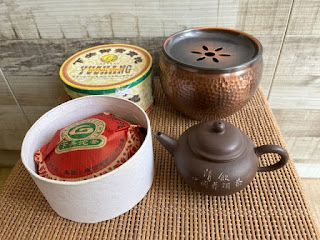It is winter in Paris and I am brewing and drinking Chinese tea. I had, in my previous blog entry, decided on the tea I had selected for my overseas adventure. One reader asked "no xiaguan? ". Yes, I managed to packed some 2006 Yue Shang Raw tuo.
I had brewed this tea a couple of days before my trip. I enjoyed this tea a lot and I was eager to brew this tea when I arrived in Paris.
The tea tasted different. It tasted less vibrant and aromatic. I tried a longer infusion time but the results was not any better. I thought it may be due to the water. I tried a ripe 7581 pu erh tea the next day and the tea tasted alright. I concluded that this tea went into hibernation during the air flight and needed time to 'adjust' to the new climate. This phenomena was highlighted by many tea experts (residing in USA) who had ordered tea from overseas and tried the tea when the order had arrived. Cwyn renown for her 'death by tea' blog recommend to rest the tea for a couple of weeks before you brew the tea. This allow the tea to adjust to the new climate. It is like awaking the tea or Xin-cha in Chinese. The tea will taste better after a couple of weeks. I cannot explain this awaking phenomena but my many overseas friends has 'sworn' to rest their newly ordered tea for a couple of weeks before brewing the tea.
I am going to let this tea rest and drink my other tea stash. As a reward of my clever sleuthing, I had rewarded myself with buying a Sherlock Holmes novel, printed in 1893, from the famous Abbey Bookshop in Paris.


